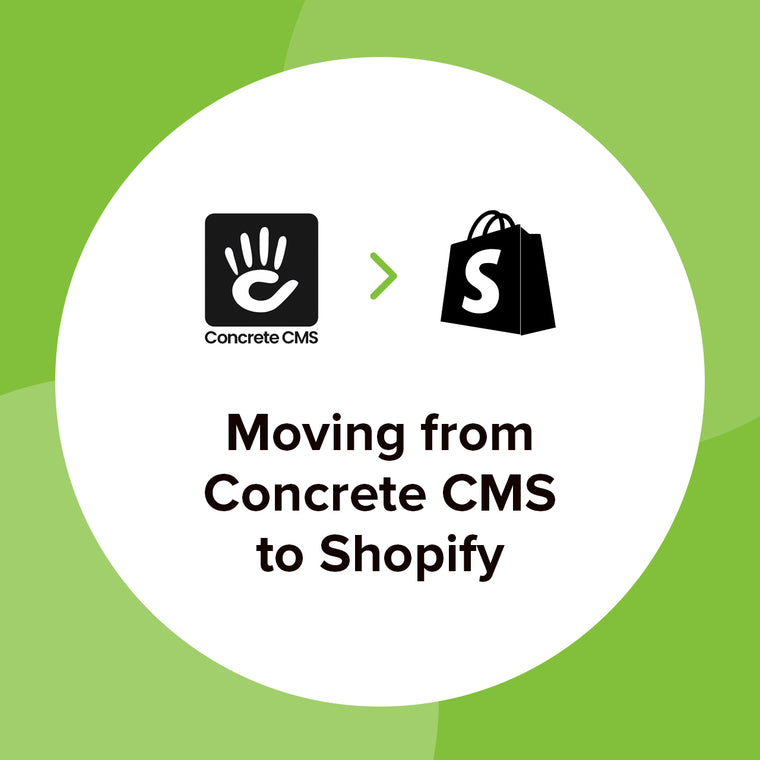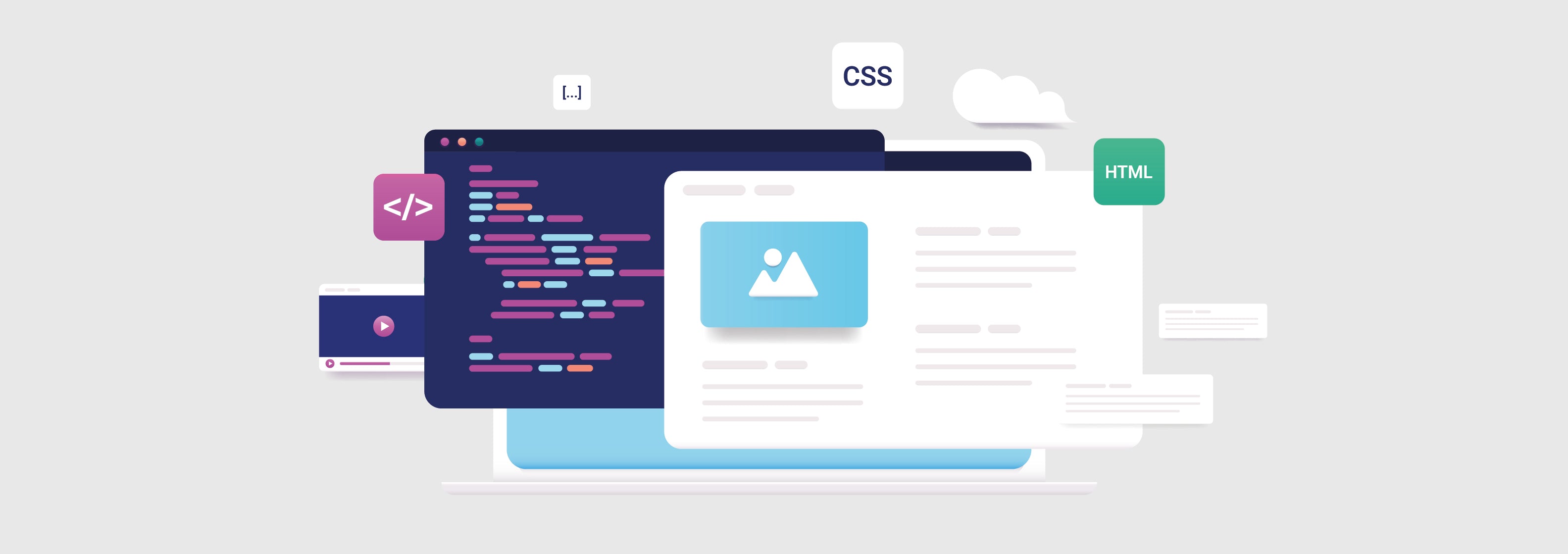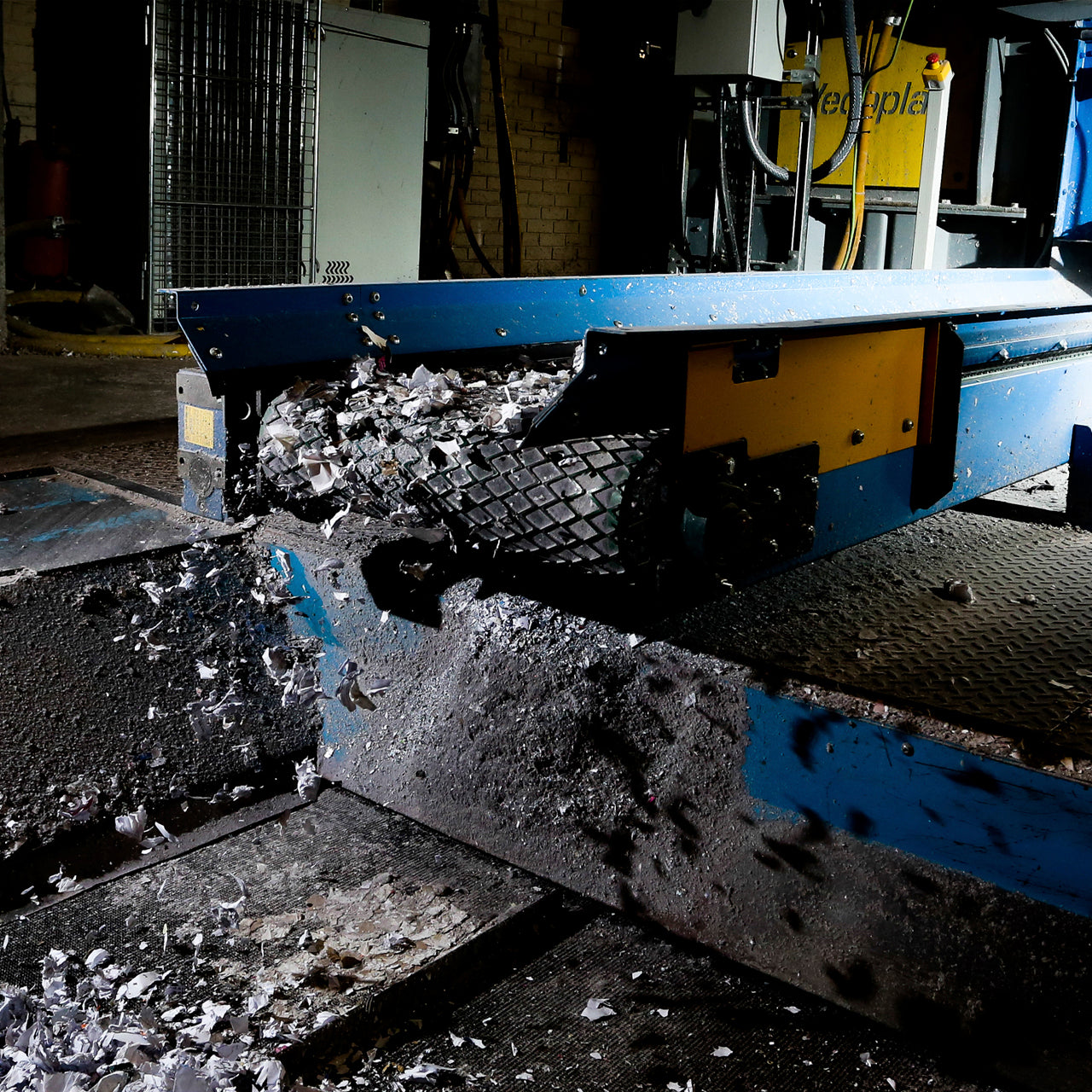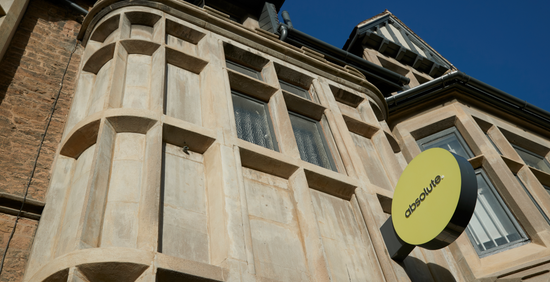Why switching to Shopify from Concrete CMS is the smart move
Running your store on Concrete CMS can feel restrictive as your business grows. Migrating to Shopify or Shopify Plus gives you a faster, easier, and more scalable platform built for modern eCommerce.

The growing limitations of Concrete CMS
If you’re currently running your online store on Concrete CMS (formerly Concrete 5), chances are you’ve started to notice its limitations. While Concrete CMS may have served you well in the past, it wasn’t designed to keep pace with today’s fast-moving eCommerce landscape.
Many businesses now find it difficult to maintain, expensive to customise, and restrictive when it comes to scaling. For eCommerce managers and business owners, this can create unnecessary headaches — especially when smoother, more powerful options like Shopify are available.
Migrating to Shopify or Shopify Plus from Concrete may feel daunting on the surface, but it’s one of the smartest long-term investments you can make for your business. Shopify offers scalability, ease of management, and high performance out of the box without the heavy reliance on developers. That reliance on developers is something may still be experiencing for your Concrete website.
Better still, Shopify’s ecosystem of apps, integrations, and themes makes it far easier to grow and adapt your store to meet customer expectations. Learn more about our Shopify services.
Of course, one of the biggest concerns when moving platforms is the risk of losing valuable data, such as products, customer information, or SEO-friendly URLs. Downtime, broken functionality, or unexpected costs can also weigh heavily on decision-makers.
That’s why working with an experienced Shopify agency is essential. With the right partner, your migration can be smooth, secure, and structured around your business goals.
As a Shopify Plus agency, we have guided countless businesses through successful migrations. From carefully mapping data to safeguarding search rankings and maintaining site performance, we know how to minimise disruption and maximise results. If you’re ready to migrate to Shopify and future-proof your eCommerce store, this guide will walk you through the benefits, challenges, and process step by step.

Why did Concrete 5 rebrand to Concrete CMS?
Concrete CMS transitioned from the Concrete5 brand to clarify its identity and address confusion in the market. The "5" was initially added because it was the fifth major rebuild of the software and aligned with the branding at the time. However, over time, the "5" in Contrete became confusing, especially with the software's growth and focus on the business market.
The name change to Concrete CMS, which is the original name, is intended to better reflect the product's maturity and its position as a robust content management system for businesses.
Concrete CMS and Shopify comparison
When considering migrating to Shopify from Concrete CMS, it helps to look at how the two platforms stack up against each other. While Concrete was initially valued as a flexible CMS, it wasn’t built specifically for eCommerce at scale.
Shopify, on the other hand, is built for online selling, with powerful and expanding features designed to simplify management, improve security, and support long-term growth. Below, we have highlighted some of the key differences to help you see why many businesses are choosing to migrate.
Overall, while Concrete CMS offers flexibility for those with strong technical expertise, it quickly becomes costly and complex to maintain for businesses. Shopify, on the other hand, consistently comes out on top for ease of use, security, extensions, and hosting. Its all-in-one platform allows eCommerce managers and business owners to focus on growth rather than site maintenance.
With a powerful app ecosystem, built-in security, and fully managed hosting, Shopify is the clear choice for businesses looking to scale efficiently and future-proof their online store.
Ease of use
Concrete CMS can be powerful, but it does require some technical knowledge to manage updates and maintain the site. Non-technical users might find it challenging to make changes without developer help.
Shopify, on the other hand, is built for ease. Its dashboard is intuitive and designed so store managers can add products, manage orders, and customise pages without touching a line of code.
Winner: Shopify
Security
With Concrete CMS, security management falls largely on the shoulders of the site owner. That means you’re responsible for ensuring the software is always up to date, manually applying security patches as they’re released, and maintaining a secure hosting environment.
If these steps aren’t handled promptly, vulnerabilities can go unnoticed — leaving the site exposed to potential threats such as outdated plugins, brute-force attacks, or unpatched server exploits.
Shopify, on the other hand, manages all of this heavy-lifting for you. It’s a fully hosted CMS, so enterprise-level security is built in by default. SSL certificates, PCI compliance, and automatic platform updates are included and maintained by Shopify, ensuring your store is always protected without the need for manual intervention. This means fewer maintenance headaches and a reduced risk of downtime.
Winner: Shopify
Customisation
Concrete CMS is open source, which gives you a high level of flexibility — provided you or your team have the right technical expertise. Almost every element of the site can be customised, from layout and functionality to backend integrations. However, this freedom often comes with added complexity.
Most changes require developer input, and updates or feature enhancements can take longer to implement, especially if custom code needs to be maintained or adapted for compatibility.
Shopify offers a different kind of flexibility for your business. While it’s not open source, it balances creative control and ease of use. The platform includes a huge selection of professionally designed themes and intuitive customisation tools that allow non-developers to adjust layouts and settings.
For deeper control of the website, developers can dive into Liquid, Shopify’s templating language, to fine-tune design and functionality. This combination means you get flexibility without the constant need for technical maintenance — allowing store owners to focus on growth rather than code upkeep.
Winner: It's a tie (depends on your needs)
Extensions and apps
Concrete CMS has a smaller add-on marketplace than Shopify's, which can limit the options available for extending functionality. While it’s possible to create almost anything through custom code, integrations — such as payment gateways, marketing tools, or CRM connections — often require bespoke development. This can add time and cost to projects, as every feature needs to be built, tested, and maintained.
Shopify has one of the largest eCommerce app ecosystems in the world. Its App Store offers thousands of ready-to-use integrations covering everything from payments, shipping, and inventory management to marketing automation, analytics, and customer service tools.
Most Shopify apps can be installed in a few clicks, instantly expanding your store’s capabilities without development work. For businesses with more advanced needs, developers can still create custom apps or extend existing ones — giving Shopify merchants the best of both worlds: convenience and scalability.
Winner: Shopify
Hosting
Concrete CMS is self-hosted, which means performance, uptime, and server reliability are all managed by the site owner or their hosting provider. You’re entirely responsible for choosing the right hosting setup, monitoring server health, applying updates, and scaling resources as traffic grows.
While this gives you full control over your environment, it also means added complexity, potential downtime risks, and ongoing costs to maintain fast and secure performance.
Shopify, on the other hand, is a fully hosted and managed SaaS platform. Everything from uptime and scalability to global performance optimisation is handled automatically. Your store runs on Shopify’s high-speed infrastructure, backed by worldwide CDN coverage and enterprise-grade reliability.
There’s no need to worry about server maintenance, bandwidth limits, or performance tuning — Shopify keeps your site fast, secure, and available around the clock, no matter where your customers are.
Winner: Shopify
Planning your Concrete CMS to Shopify migration
Before you migrate from Concrete CMS to Shopify, it’s crucial to plan carefully. Key considerations include mapping your data (products, customer records, and order history), ensuring your design translates into a modern Shopify theme, and protecting your SEO by preserving URLs, redirects, and meta data.
Without a clear migration strategy, businesses risk broken links, lost customer information, downtime, or even a drop in search rankings, all of which can impact sales and brand trust. This is where working with an experienced Shopify expert makes all the difference when migrating your Concrete CMS website.
A trusted Shopify agency like Absolute Design will carry out a full pre-migration audit, create a tailored migration plan, and use proven processes to safeguard your data and SEO. The end result is a smooth transition that avoids costly mistakes and ensures your new site is ready to perform from day one.
How we migrate Concrete CMS websites to Shopify
Migrating from Concrete CMS to Shopify isn’t just about moving data — it’s about making sure your new store is set up for long-term growth. We follow a tried-and-tested process that ensures every detail is accounted for, from product data to SEO performance. Our goal is to make the transition seamless, avoiding downtime and protecting the hard work you’ve already invested in your website.
How we approach the migration process
Step 1: Exporting data from Concrete CMS
We begin by extracting all essential data from your Concrete CMS store, including products, categories, customer information, and order history, using tools such as Matrixify for smooth transfers. This data is carefully reviewed, cleaned, and formatted to ensure it transfers smoothly into Shopify without errors.
Step 2: Rebuilding your design or selecting a Shopify theme
Next, we look at the visual side of your site. Some businesses want to recreate the look and feel of their existing Concrete CMS website, while others prefer to adopt a fresh look from the Shopify theme store. Our team works with you to choose the right approach, whether its custom-building your design on Shopify or tailoring a theme that fits your brand.
Step 3: Preserving SEO performance
One of the biggest risks in any website migration is losing search rankings. To prevent this, we set up 301 redirects for old URLs, migrate metadata, and implement structured data so your site will remain search-friendly. This ensures customers can still find you online and that your traffic isn’t disrupted post-launch.
Step 4: Testing and launch
Before going live, we conduct thorough testing on your new Shopify store. This includes checking site speed, functionality, payment gateways, and customer flows (such as browsing, checkout, and account login). Only once we’re confident everything is performing perfectly do we launch your new store, minimising downtime and ensuring a smooth switch from Concrete CMS to Shopify.

Benefits of working with a Shopify agency
Migrating from to Shopify involves a number of technical complexities — moving data securely, rebuilding designs, and safeguarding SEO performance. Attempting this without the right expertise can be risky and time-consuming. By working with a certified Shopify agency, you benefit from specialists who understand the platform inside out and follow proven migration processes.
As a Shopify Plus partner, we’ve helped valued clients like Julian Bowen (furniture retailer) and Shredall (document management and shredding specialists) successfully move to Shopify. These projects not only preserved their data and search rankings but also delivered faster, more scalable websites.
Partnering with Shopify experts gives you the peace of mind that every stage of your migration is handled correctly, so you can focus on running your business. Learn more about our B2B Shopify solutions
Client success stories
Julian Bowen – Scalable eCommerce for a leading furniture supplier
We migrated Julian Bowen’s extensive product catalogue from Concrete CMS to Shopify, ensuring all SEO rankings and customer data were preserved. The new Shopify store delivered faster performance, easier day-to-day management, and a mobile-friendly design that supports their ongoing growth.
- Large product catalogue successfully migrated
- SEO and traffic preserved
- Faster, mobile-optimised website
Shredall – Modernising an outdated Concrete CMS website
Shredall needed a platform that was easier to maintain and more effective at generating leads. We rebuilt their site on Shopify with a fresh design and streamlined functionality, while carefully migrating their customer data and search rankings.
- New Shopify site designed for lead generation
- Customer data and SEO fully safeguarded
- Simple content management for their team
Ready to migrate to Shopify?
Migrating to Shopify from Concrete doesn’t have to be stressful or risky. Our team of certified Shopify migration experts handles every step of the process, from data export and theme setup to SEO preservation and testing — so you can focus on running your business.
Speak to our Shopify migration specialists today and get a clear roadmap for moving from Concrete CMS to Shopify with zero headaches. Our free consultation is a low-commitment way to explore your options, understand timelines and costs, and start planning a smooth, successful migration.
CASE STUDIES

Shredall
Shredall recently approached us for a brand new Shopify website build, as the old site was built with an outdated Concrete5 platform and no longer met their requirements.
-
Shopify

Julian Bowen
A theme-led Shopify build helped Julian Bowen modernise their online presence, integrate core systems and deliver long-term scalability without disrupting existing operations.
-
Shopify
CONTACT
Ready to take the next step in your eCommerce journey?
Absolute Design, an award-winning Shopify Plus agency based in Nottingham, is here to help. As a leading Shopify Plus agency, we have the expertise and experience to guide you through every step of your migration to Shopify Plus. Contact us today and let's transform your online store into a thriving digital success story.

Enter your email address to sign up to our newsletter, featuring case studies, insights, industry news and much more.
